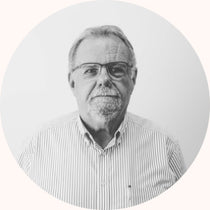How to Lower Cortisol (Naturally) for Less Stress & a Healthier Life
Key Takeaways:
Key Points:
- High cortisol levels result from physical and emotional stress on the body and can lead to symptoms such as fatigue, brain fog, irritability, weight gain, inflammation, and more.
- Practices for lowering cortisol include stress identification and reduction, eating a whole foods diet, prioritizing minerals, supplementing when needed, etc.
- With dedication to diet and stress management, regulating cortisol is absolutely possible.
We often think of “stress” as a key contributor to developing disease, but that isn’t the most accurate word to describe the mechanism behind what’s actually happening in the body.
Instead, we should turn our attention to our cortisol, the stress-adapting hormone produced by the adrenal glands. Cortisol is released in response to threatening situations when the body’s survival mechanisms kick in. In acute stress situations, cortisol can help you run faster or fight off an attacker, heightening your senses and putting you on alert (learn more about cortisol’s role in the body here). When the danger has passed, cortisol levels drop, allowing you to rest.
But modern life, where stressors are constant and surround us in many different forms, has made many of us overproduce cortisol. This overproduction results in fatigue, brain fog, mood issues, hormonal dysregulation, and eventually adrenal burnout.
Fortunately, there are steps you can take to reduce your body’s cortisol production and restore balance to the stress response.
Table of contents:
- What Causes High Cortisol Levels?
- High Cortisol Symptoms
- How to Lower Cortisol Levels Naturally
- Lowering & Regulating Cortisol for a Healthier You
What Causes High Cortisol Levels?
Imagine the body as a finely tuned orchestra, where cortisol plays the role of the lead conductor. However, like any conductor, cortisol can become overzealous. Several factors can lead to this heightened activity, turning the once harmonious melody into an uproar of stress hormones. Let's delve into some of the common culprits:
- Chronic Stress: Constant and prolonged exposure to physical, emotional, or psychological stress prompts the hypothalamus (a part of the brain) to stimulate cortisol production via the adrenal glands. This sustained activation can lead to overproduction, even when there are no immediate threats.
- Psychological Factors: Conditions like anxiety, depression, and trauma can further disrupt the brain's stress response system, sending distorted signals to the hypothalamus that trigger too much cortisol release. These conditions often involve negative thought patterns and heightened perception of threat, even in peaceful environments.
- Medical Conditions: Certain medical issues directly disrupt the hormonal feedback loops governing cortisol production. Examples include Cushing's syndrome (pituitary gland overstimulation), adrenal tumors, and thyroid disorders. These can cause independent cortisol overproduction — regardless of actual stress levels.
- Lifestyle Factors: Poor sleep is another factor that disrupts the natural cortisol rhythm, leading to elevated daytime and reduced nighttime levels. Excessive alcohol consumption puts stress on the body and impairs cortisol breakdown, contributing to accumulation. Chronic inflammation, often linked to an unhealthy diet and lack of exercise (we’ll discuss this more later), can also stimulate stress hormone release.
High Cortisol Symptoms
So now that we know what leads to high cortisol levels, what are the biological consequences of this imbalance? Constantly high cortisol levels can cause a whole host of malfunctions and dysregulation in the body. You might have heard of the hypothalamic-pituitary-adrenal, or HPA axis; this team of glands regulates the release of cortisol, along with a few other hormones. When the demand for cortisol remains high and the body is not able to keep up with production, the HPA axis becomes dysregulated.
From there, many symptoms can start to manifest, including:
- Fatigue and trouble sleeping: Feeling exhausted during the day and revved up at night indicates that the normal rhythm of cortisol production has been altered (it normally peaks in the morning and falls throughout the day, allowing you to fall asleep easily at night).
- Brain fog: Inability to think clearly and/or hold attention for long periods of time.
- Mood imbalances: Including depression, anxiety, irritability, and cognitive impairment.
- Weight gain: High cortisol levels can cause weight gain in the face and abdomen. This is also associated with synthetic steroid use (prednisone, hydrocortisone), which is essentially artificial cortisol and is often used as a temporary treatment for various autoimmune diseases.
- Impaired immunity: High cortisol suppresses the immune system in favor of supporting the systems needed for immediate survival. In other words, your body is thinking “who needs an immune system when you’re being attacked by a dangerous predator?”
- Bone and muscle weakness: High cortisol levels can also lower bone mineral density and induce muscle breakdown, further contributing to fatigue.
- Inflammation: Cortisol itself is an anti-inflammatory hormone — however, in excess, it can actually cause additional inflammation over time, particularly in the central nervous system.
Unless you are providing an abundance of nutrients and rest for your body while in a constant high-stress lifestyle, your adrenals will burn out from constantly churning out cortisol, and then you’ll underproduce cortisol. This is what people refer to when they talk about “adrenal fatigue.”
How to Lower Cortisol Levels Naturally
Fortunately, there are many ways to reduce your cortisol levels if they are chronically elevated (which is probably the case for just about everyone at some point in their lives). Here are some natural methods to lower your cortisol over time:
Reduce Stress
Stress is the number one cause of high cortisol levels. This can look like financial anxiety, overworking, relationship issues, health concerns for ourselves or loved ones, and all of the many worries that we deal with on a daily basis. It also can come from physical sources too, like chronic pain or over-exercising.
Reducing stress is definitely easier said than done, but you can’t let it fall to the bottom of your to-do list. Schedule time for activities that help you unwind and release those worries (examples below!), even if it's only temporary. Your adrenals will thank you.
Prioritizing Minerals, Macronutrients, & Eating Regularly
Nutrition is often overlooked in the discussion around stress management and lowering cortisol. But your adrenals need certain nutrients to be able to produce cortisol and the other glucocorticoid hormones. For lowering and stabilizing cortisol levels, we have to fuel the body with an appropriate balance of macronutrients: protein, carbs, and healthy fats from whole foods. But, it’s also important to eat regular meals. For a body under stress with high cortisol output, fasting has been shown to be quite detrimental and promotes the release of more cortisol.
Ensuring an adequate (or higher) intake of minerals is also extremely important to manage and lower cortisol. Magnesium, in particular, is very helpful for lowering cortisol, and is also rapidly used up by the adrenals. Magnesium supports over 300 reactions in the human body, and our soils are chronically depleted of this key mineral.
High cortisol also depletes potassium and sodium, so supplementing with electrolytes added to your daily water intake may help stabilize and regulate your cortisol levels.*
Foods that Lower Cortisol
With those key vitamins, minerals, and nutrients in mind, there are some particular foods that you can prioritize in your diet to get more of these and lower cortisol levels:
- Bananas, citrus, berries, and many other fruits (high in minerals and vitamin C)
- Avocados (healthy fat + potassium)
- Dark chocolate (high in magnesium)
- Green or black tea
- Probiotic foods (yogurt, kimchi, sauerkraut)
- Complex carbs, aka carbs with nutrients and fiber (potatoes, whole grains, root vegetables, etc.)
- Eggs (good source of choline, which supports brain function — where two-thirds of the HPA axis lives)
Supplements to Lower Cortisol
After you have your foundation of diet and stress reduction practices, there are many supplements you can add for a little extra support. Some of these include:
- Adaptogens: Certain mushrooms and herbs that have a modulatory effect on cortisol and other hormones.* This means that they raise it when it’s low or lower it when it’s high, depending on what your body needs. These include ashwagandha, rhodiola, schisandra, and others.
- Amino acids: Certain amino acids, the building blocks of proteins, have calming effects, such as taurine, glycine, tyrosine, and tryptophan.*
- Herbs: Well-known plant extracts like chamomile and lavender can calm you down and lower the cortisol response, whether in the form of tea, a tincture, or essential oil.*
- Fish oil: A great source of omega-3 fatty acids, which have been shown to reduce cortisol levels, fish oil is an easy supplement to add — the key is finding a supplement that’s processed correctly so it retains these benefits.
These are just a few options for cortisol-lowering supplements. You could also consider mineral supplementation, as many people find they can not get enough in their diet, especially magnesium.
Our BodyBio Calm is formulated with 5 specific stress-reducing ingredients, designed to balance the production, distribution, and metabolism of cortisol for a healthy stress response.*
Read more about Calm in our blog here.
Go Outside
There’s something about the great outdoors that naturally puts us at ease and takes the stress response down a notch or two. A 2019 study showed that people who walked for 15 minutes in a forest were able to lower their cortisol levels. The study took inspiration from the Japanese concept of forest bathing, which is said to promote well-being.
Earthing, being connected to the earth through the soles of the feet or otherwise in direct contact with the ground, has also been shown in research to lower and stabilize the body’s natural cortisol production rhythm.
Exercise
Exercise can have great stress-reducing effects, but only at a moderate intensity. Research finds that high-intensity exercise will actually increase cortisol levels, because the body is physically under stress. However, low intensity (40% of max output) will actually lower cortisol levels. Activities that fit this type of exercise include yoga, walking, casual recreational sports, or maybe just playing with your dog in the yard.
Unplug
Electronics use, especially at night, can dysregulate your cortisol production. A 2018 study on rats found that exposure to cell phone radiofrequency increases cortisol and ACTH (adrenocorticotropic) hormones. Another similar study found that radiofrequency electromagnetic field exposure from mobile phones induces oxidative stress, inflammatory response, and HPA axis dysregulation.
This is a great method to pair with grounding or earthing to mitigate these harmful effects, — so stop scrolling and get outside!
Meditation & Mindfulness
A meditation practice can also lower cortisol and relieve stress, especially for those with a somatic illness and those living in stressful life situations.
Meditation does not have to look like sitting in silence with your legs crossed and eyes closed. You can try a guided meditation that takes you through a calming scenario like a walk along the ocean or has you focus on thoughts of gratitude. Meditation can even be a walk through the park as you intentionally take notice of the nature around you. Find a form of mindfulness meditation that suits you.
Lowering & Regulating Cortisol for a Healthier You
High cortisol levels, caused by high stress, lack of nutrition from whole foods, and even over-exercising, can be seriously damaging to your body over time. With these kinds of patterns, burnout is inevitable.
But there are steps you can take immediately to start lowering your cortisol levels and reducing daily stress.
If you decide that supplementation is part of your stress reduction strategy, check out our BodyBio Calm supplement for foundational support, and pair it with E-Lyte to replenish key stress-relieving minerals like potassium, sodium, magnesium, and more.*
Karin, O., Raz, M., Tendler, A., Bar, A., Korem Kohanim, Y., Milo, T., & Alon, U. (2020). A new model for the HPA axis explains dysregulation of stress hormones on the timescale of weeks. Molecular systems biology, 16(7), e9510. https://doi.org/10.15252/msb.20209510
McEwen B. S. (2008). Central effects of stress hormones in health and disease: Understanding the protective and damaging effects of stress and stress mediators. European journal of pharmacology, 583(2-3), 174–185. https://doi.org/10.1016/j.ejphar.2007.11.071
Shannon L. Mathis, Richard S. Farley, Dana K. Fuller, Amy E. Jetton, Jennifer L. Caputo, "The Relationship between Cortisol and Bone Mineral Density in Competitive Male Cyclists", Journal of Sports Medicine, vol. 2013, Article ID 896821, 7 pages, 2013. https://doi.org/10.1155/2013/896821
Sorrells, S. F., Caso, J. R., Munhoz, C. D., & Sapolsky, R. M. (2009). The stressed CNS: when glucocorticoids aggravate inflammation. Neuron, 64(1), 33–39. https://doi.org/10.1016/j.neuron.2009.09.032
Hannibal, K. E., & Bishop, M. D. (2014). Chronic stress, cortisol dysfunction, and pain: a psychoneuroendocrine rationale for stress management in pain rehabilitation. Physical therapy, 94(12), 1816–1825. https://doi.org/10.2522/ptj.20130597
Nakamura, Y., Walker, B. R., & Ikuta, T. (2016). Systematic review and meta-analysis reveals acutely elevated plasma cortisol following fasting but not less severe calorie restriction. Stress (Amsterdam, Netherlands), 19(2), 151–157. https://doi.org/10.3109/10253890.2015.1121984
Cuciureanu MD, Vink R. Magnesium and stress. In: Vink R, Nechifor M, editors. Magnesium in the Central Nervous System [Internet]. Adelaide (AU): University of Adelaide Press; 2011. Available from: https://www.ncbi.nlm.nih.gov/books/NBK507250/
Fan, L., Zhuang, Y., Wang, Y., Liu, X., Liu, D., Xiang, B., He, M., Zhang, Z., Li, Y., Wang, Y., Zhu, X., & Ye, H. (2020). Association of hypokalemia with cortisol and ACTH levels in Cushing's disease. Annals of the New York Academy of Sciences, 1463(1), 60–66. https://doi.org/10.1111/nyas.14205
McLaughlan, E., & Barth, J. H. (2017). An analysis of the relationship between serum cortisol and serum sodium in routine clinical patients. Practical laboratory medicine, 8, 30–33. https://doi.org/10.1016/j.plabm.2017.04.003
Steptoe, A., Gibson, E. L., Vuononvirta, R., Williams, E. D., Hamer, M., Rycroft, J. A., Erusalimsky, J. D., & Wardle, J. (2007). The effects of tea on psychophysiological stress responsivity and post-stress recovery: a randomised double-blind trial. Psychopharmacology, 190(1), 81–89. https://doi.org/10.1007/s00213-006-0573-2
Kazemi, A., Noorbala, A. A., Azam, K., Eskandari, M. H., & Djafarian, K. (2019). Effect of probiotic and prebiotic vs placebo on psychological outcomes in patients with major depressive disorder: A randomized clinical trial. Clinical nutrition (Edinburgh, Scotland), 38(2), 522–528. https://doi.org/10.1016/j.clnu.2018.04.010
Liao, L. Y., He, Y. F., Li, L., Meng, H., Dong, Y. M., Yi, F., & Xiao, P. G. (2018). A preliminary review of studies on adaptogens: comparison of their bioactivity in TCM with that of ginseng-like herbs used worldwide. Chinese medicine, 13, 57. https://doi.org/10.1186/s13020-018-0214-9
Lakhan, S.E., Vieira, K.F. Nutritional and herbal supplements for anxiety and anxiety-related disorders: systematic review. Nutr J 9, 42 (2010). https://doi.org/10.1186/1475-2891-9-42
Srivastava, J. K., Shankar, E., & Gupta, S. (2010). Chamomile: A herbal medicine of the past with bright future. Molecular medicine reports, 3(6), 895–901. https://doi.org/10.3892/mmr.2010.377
Kobayashi, H., Song, C., Ikei, H., Park, B. J., Kagawa, T., & Miyazaki, Y. (2019). Combined Effect of Walking and Forest Environment on Salivary Cortisol Concentration. Frontiers in public health, 7, 376. https://doi.org/10.3389/fpubh.2019.00376
Ghaly, M., & Teplitz, D. (2004). The biologic effects of grounding the human body during sleep as measured by cortisol levels and subjective reporting of sleep, pain, and stress. Journal of alternative and complementary medicine (New York, N.Y.), 10(5), 767–776. https://doi.org/10.1089/acm.2004.10.767
Hill, E. E., Zack, E., Battaglini, C., Viru, M., Viru, A., & Hackney, A. C. (2008). Exercise and circulating cortisol levels: the intensity threshold effect. Journal of endocrinological investigation, 31(7), 587–591. https://doi.org/10.1007/BF03345606
Singh, K. V., Gautam, R., Meena, R., Nirala, J. P., Jha, S. K., & Rajamani, P. (2020). Effect of mobile phone radiation on oxidative stress, inflammatory response, and contextual fear memory in Wistar rat. Environmental science and pollution research international, 27(16), 19340–19351. https://doi.org/10.1007/s11356-020-07916-z
Adam Koncz, Zsolt Demetrovics & Zsofia K. Takacs (2021) Meditation interventions efficiently reduce cortisol levels of at-risk samples: a meta-analysis, Health Psychology Review, 15:1, 56-84. https://doi.org/10.1080/17437199.2020.1760727








